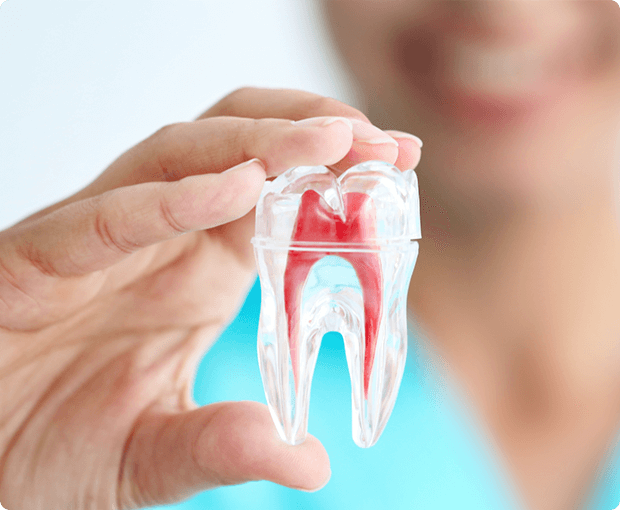What is a Root Canal?
Root canal is the natural cavity in the centre of the tooth. Inside the root canal is a soft tissue called pulp which contains blood vessels, nerves and connective tissue that help grow the root of your tooth during its development. Millions of people every year get root canal treatment when a tooth’s nerve and pulp are damaged. This can happen for various reasons including deep decay, a crack in the tooth or trauma to the face.
A root canal infection must be addressed as soon as possible because it can cause:
- Swelling that may spread to other areas of the face, neck or head
- Drainage when there is a hole on the side of the tooth
- Bone loss around the tip of the root
If the infected tooth is left untreated for a longer period of time, it can cause more pain or lead to an abscess, a pus pocket that forms around an infected tooth.


Benefits of Root Canal Treatment
The purpose of a root canal treatment is to repair and save a tooth that is severely infected or damaged. Thanks to advances in technology, the treatment is a relatively painless and very effective procedure. It can be done in one or two appointments depending on the condition of your teeth.
There are many advantages to receiving a root canal treatment including the following:
- Saves you from removing the tooth
- The pain caused by the infected tooth goes away
- It helps stop the formation of abscess
- The removal of bacteria prevents the spread of infection to other tissues
What happens during a root canal treatment?
The first step of root canal treatment is to take an X-ray to determine if there are signs of infections surrounding the bone. Then, the dentist carefully removes the pulp inside the tooth, cleans and disinfects the root canal. Once the injured or dead pulp is removed, the space within the hard layers of the tooth is filled with gutta-percha that helps to obturate the space.
If the root canal is not completed on the same day, a temporary filling is placed in the exterior hole of the tooth to keep out contaminants like saliva and food between appointments.
After a root canal, it’s normal for the tooth to be sore for a week or two. But you can usually eat normally a few days after the procedure.

What is a Root Canal Infection?
A tooth’s pulp can be damaged for various reasons including deep decay, repeated dental procedures on a tooth, a crack or chip in the tooth or trauma to the tooth.

A root canal infection can cause:
- Swelling that may spread to other areas of the face, neck or head
- Bone loss around the tip of the root
- Drainage when there is a hole on the side of the gums
What is a Root Canal Treatment?
The goal of a root canal treatment is to repair and save a tooth that is severely infected or damaged.
It is important to remove the tooth pulp because when the pulp is damaged, it breaks down and bacteria can multiply in the pulp chamber. The bacteria can cause an infection. Without treatment, the infection can be bad enough that the tooth has to be removed. That’s why it is crucial that you contact our office to be treated as soon as possible.
Root canal treatment is often a straightforward and painless procedure thanks to the advances in technology and the use of anesthetics.
During a root canal, our endodontist carefully removes the pulp inside your tooth, cleans the root canals and disinfects them. Once the injured or dead pulp is removed, the space is filled with fillers that opturates the canals.
What Are Signs That Root Canal Treatment is Needed?
It’s important to see our dentist regularly because sometimes symptoms of an infected root canal don’t show at all.
Here are a few signs that you need a root canal:
- Persistent pain is an indication that something is wrong in the tooth
- Chipped or cracked teeth can expose the nerves under the tooth’s surface and lead to an infection
- Your teeth are sensitive and feel intense pain when you have hot or cold drinks
- Swollen gums could be signs that there are problems at the tip of the tooth
- Your teeth can become discolored from poor hygiene, exposure to food and drinks, which stain the tooth enamel and can cause nerve damage
- Deep decay in the base of the tooth
Contact us if you experience any of these signs so you can get a proper examination.
What is a Root Canal Process?
A root canal can be done in one or two appointments.
Before the treatment, your tooth and surrounding tissue will be numbed. We also offer sedation dentistry services where we provide medication to help you relax during the entire procedure.
An access hole will be drilled in the tooth so the pulp, bacteria, decayed nerve tissue and other debris are removed from the tooth. Once the canals are thoroughly cleaned, they are sealed.
If the root canal is not completed on the same day, a temporary filling is placed in the exterior hole of the tooth to keep out contaminants like saliva and food between appointments.
After a root canal, it’s normal for the tooth to be sore for a week or two. But it’s not normal to feel excessive pain or swelling for a long period of time. If this happens, contact our dentist.
Contact Us
Contact us if you want to know more about what is a root canal or want to have root canal treatment.



